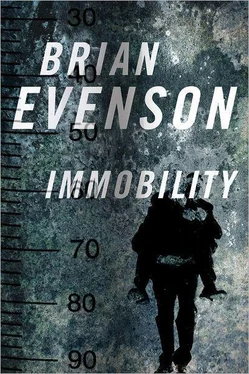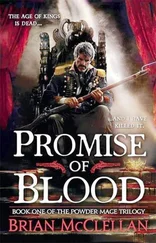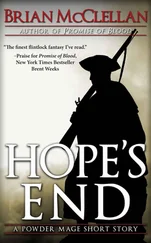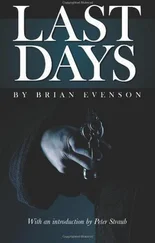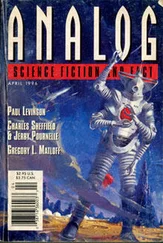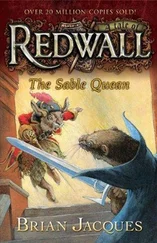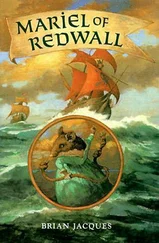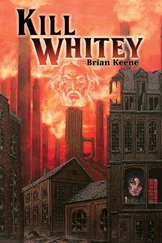Almost immediately they passed two additional shattered glass structures, much smaller and set near the ground, then two more. They were hardly bigger than a small house, and low enough that when his mule passed close to the last one, he could look down through it. In the dull glow of the sunsmear, he caught glimpses of rows of shelves, scattered and tumbled, rickety piles of books. He glimpsed as well several dead bodies, some nearly perfectly preserved, others little more than scattered bones. They’d probably been left undisturbed, he suddenly realized, for several decades.
The mule he was riding noticed him leaning and looking, and half turned so that Horkai could see a sliver of his faceplate and, through that, a sliver of his face. “Too bad they chose glass,” the speaker on the suit said. “If they had kept it concrete, there would be a lot more safe space. A few more would be alive.”
A line of twisted, blackened stumps, too small to be trees—the desiccated, petrified remains of bushes, maybe. More cracked concrete, steps this time, and sufficiently shattered that the mules had to pick their way up them for a moment on all fours. Despite this, the mule beneath him seemed to carry him effortlessly, as if this movement was well practiced. The other was carrying both packs, one slung over his back, the other over his chest, which made him look like he had a carapace.
There, to the east, over the remnants of buildings and through the haze, he could discern the vague shape of the mountains, closer than he’d imagined. He was, he realized, looking for something. And then he saw it, a grayish shape, halfway up the slope. It used to be a letter, he remembered, made of stones arranged on the side of the mountain, several hundred feet tall. What was it again? He couldn’t remember. Now it was nearly faded away, lost among the stone of a slope now mostly bare. The slope hadn’t always been like that, he sensed, had once been thick with trees and brush, but what had the letter been?
At the top of the stairs, a devastated and semi-collapsed building, roughly in the shape of an X. In front of it, fallen to one side and staring up into the sky, a bronze statue, roughly the same height as his mules. It depicted a man with long hair, clean-shaven and sporting a cravat. He was wearing the bronze equivalent of a heavy old-fashioned coat, a waistcoat beneath, something running over it—the chain of a watch or the strap of a gun holster or the thong of a canteen. In one hand he held a cane, broken halfway down.
The two mules stopped and knelt before the statue. They reached out to touch the statue’s forehead, muttering something in unison.
“What is it?” Horkai asked. “Who is he?”
“The founder,” said the mule he was riding. He gestured all around him. “He made all this,” he said. “The place that this is. Before it was destroyed.”
“Is he a kind of god to you?” asked Horkai, suddenly nervous.
“Not a kind of god,” said the mule. “The founder. He’s not a god. He’s not perfect.”
“He shouldn’t have made these roofs in glass,” said the other mule.
“He did the best he could,” said the first mule.
“Why do you touch him? For luck?”
The first mule shook his head. “Because this is as far as we’ve ever gone. We’ve never gone past him.”
“You’re kidding,” said Horkai.
“No,” said the mule. “I am not kidding.”
“We came into being there,” said the other mule, gesturing behind them. “We have stayed there ever since, studying the maps, waiting for this day. We thank you for making this day possible.”
“You’re welcome,” said Horkai, not knowing what else to say, as the two mules regained their footing and set off again.
THEY SKIRTED THE RUINED BUILDING, entered a broken expanse of asphalt, the remains of a parking lot dotted with cars, their tires cracked and mostly gone. Some were ruined and at angles, some parked in an orderly fashion, all of them stripped to bare metal by wind and dust, their windshields often blasted opaque. For a moment, a brief flash, he saw the lot as it had been, surrounded by trees, the curving pedestrian bridge leading a few hundred feet or so away to a stadium or coliseum, and then the vision was gone.
The bridge to the stadium was collapsed now, and the stadium, too, must have fallen, was no longer looming visibly over the road. In the lot, most of the cars were empty, though in a few he thought he saw bodies curled on the seats, long dead. Some cars had their doors open and here and there, where the asphalt was most intact, he saw odd dark stains. Distorted shapes, not unlike human bodies.
They approached a corner of the lot, beyond which remains of streets ran to the four points of the compass. At the edge of the lot they paused, and the mule walking beside him turned to him. “Does this look familiar?” the mule asked.
“Some of it,” Horkai admitted.
“Can you help us know where to go next?” the mule asked.
“I don’t know,” he said. “I’ll try.”
He looked out across the intersection, to where on the far side the hill descended into a field of rubble. He tried to remember what had been there. Dormitories, maybe. To his left side a slope upward, with whatever was behind it hidden. To the right it sloped downward, going first east and then south to reveal the dark scar that the valley below had become, the lake far beyond it, a mottled gray on the horizon.
“Which way?” asked the mule. “We should not waste time.”
Horkai raised his hands somewhat helplessly, let them fall. “Straight ahead,” he finally said.
The two mules exchanged glances, though because of their hoods, Horkai had difficulty seeing the expressions on their faces. “Straight ahead we go,” said the mule beneath him, and they started off.
* * *
A SLOW BUT MILD DESCENT, picking their way through the rubble, then, soon after, an open stretch of dirt and dust. The wind picked up and blew dust everywhere. He began to wish he were wearing a suit himself. He squinted, ended up pulling his shirt high to cover his mouth, his nose. They passed an old track-and-field facility, with half-collapsed bleachers, and passed around another stadium just north of it, this one larger and in better condition. The mules gave it a wide berth.
“Why are you avoiding it?” asked Horkai.
“It might be someone’s home,” said the mule he was riding. “It will only slow us down to have to kill them.”
A ruined motel, the remains of an old museum, a replica of a dinosaur skeleton collapsing outside it. They kept up a steady pace, the mules showing no signs of flagging. Another parking lot—this one larger and spattered with large shell craters. They crossed it, came on the other side to the largest street they’d seen so far, perhaps four lanes wide or perhaps six—difficult to tell with the state it was in. In his head he saw it as six, but couldn’t tell if it was his imagination or a memory. The road was buckled and torn, but more intact than the streets they’d seen before. On one corner were the remains of a pole and the metal blade of a street sign, but it had been scoured by sand or dust until it was bare metal. Nothing Road, thought Horkai. As good a name as any. Once they were on it, they moved more quickly.
“It looks promising,” said the mule beside him, his voice just audible through the speaker. Either he wasn’t speaking directly into the microphone or his speaker had become clogged with dust.
“Which one are you?” Horkai asked.
The mule misstepped but caught himself. He drew a little closer, holding on to the other Q’s shoulder, his hand resting softly against Horkai’s side. “I’m the older one,” he said.
Читать дальше
